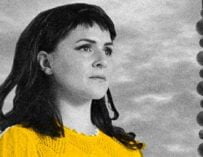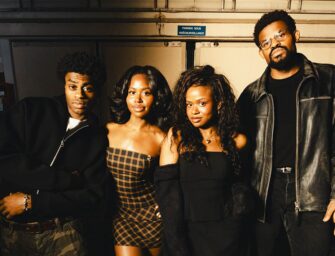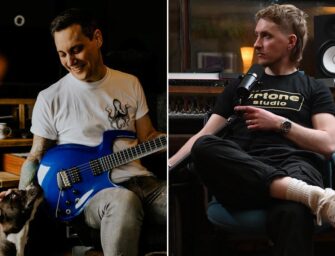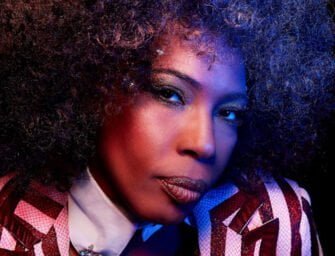
Eli “Paperboy” Reed: “I would go to Harlem every Friday and come back very energised and start writing more songs.”
We talk with the American soul singer about his new album and his inspiring work with at-risk teens in Harlem
A major label deal with Warner Bros and an album of radio/advert-friendly modern soul should have been Eli “Paperboy” Reed’s ticket to the mainstream. Unfortunately, though, it wasn’t to be. A lack of support from the label meant that 2014’s Nights Likes This wasn’t promoted heavily and failed to garner the success it deserved. Thankfully, Reed is back with both a new record and a new home on Yep Roc.
My Way Home is a return to Reed’s gospel roots and is largely inspired by his work teaching singing to at-risk teenagers in Harlem as part of the Gospel for Teens program. Fans of his album Roll With You will welcome the classic and uncluttered production sound, the soul troubadour at his authentic best. Just as renowned for his energetic live shows, much of Reed’s UK audience were first introduced to him by way of a rousing performance on Later… With Jools Holland back in 2008.
We caught up with Eli in his Brooklyn home to talk about writing My Way Home and the different influences that inspired its creation…
How did work on My Way Home begin?
“It started with the end of the summer of 2014. I’d had a pretty tough breakup with Warner Bros. My previous record didn’t get the kind of attention from the label that I thought it deserved. I came back to New York and had more time off than I’d had in a long time. Up until that point I had been teaching gospel quartet music in a programme for at-risk teens in Harlem but I’d only been doing it in my downtime, when I wasn’t on the road and could find time. At that point it became my sole focus as I didn’t really have a lot of other stuff going on, I wasn’t really touring or making much music at all.”
And that work helped to kick-start things for the new record?
“I would go once a week and it was my saving grace, these kids are all really inspiring and incredibly talented. I would go to Harlem every Friday and come back very energised and start writing more songs. The previous record for Warner had been much more of a studio creation than anything I’d ever made before. It was very built-up and I was building things from drum loops and basslines, as opposed to my original way of songwriting with just an acoustic guitar and a pad of paper. I really enjoyed doing it but I wanted to get back to what I had been doing when I started out.
[cc_blockquote_right] WHEN YOU TEACH SOMETHING YOU GET A NEW APPRECIATION FOR IT [/cc_blockquote_right]
“I also realised that I didn’t really want to write the same old love songs any more. I wasn’t in that kind of place and wanted to write music that was more serious and more universal. So that’s what I started doing.”
Were you consciously writing with My Way Home in mind at that point?
“My Way Home was the first song that I wrote for the record and then I sat on it for a while and didn’t know what to do. I went on tour with some old friends last spring to celebrate the tenth anniversary of my first album. We were playing just the way we would have played ten years ago, really free-wheelin’ kind of music. That gave me a kick in the ass to write some more stuff and at the same my drummer Noah Rubin was like ‘man I really like this new stuff you’re writing, you should do more like that.’ So I did, last April I wrote ten more songs. I had 12 or 13 all together and at the same time I’d been introduced to someone here in Brooklyn who had this really crazy analogue studio in his apartment. We got along like old friends and decided to make a record. We went into the studio and did the whole thing in about four days.”
Was it always your intention to record so quickly?
“I just didn’t think we needed to do any more. Everybody sounded good and just kind of found their place. There were just four of us, me on guitar and then bass guitar, drums and organ, and we all just knew what we were supposed to do. There was never a lot of discussion, we just fell into our parts. We didn’t do more than a couple of takes for any song.”

Eli Reed: “After you’ve come out of your comfort zone you can go back to it with a different approach.”
So a completely different approach to the one you took with Nights Like This?
“It was, and again I don’t want to discount that record. I really did love recording Nights Like This. I thought it was super fun and really different for me. But sometimes after you’ve come out of your comfort zone you can go back to it with a different approach and a renewed vigour and I think that’s what happened here.”
There’s a very spiritual feel to the album too. Do you think the gospel sound led to those themes or vice versa?
“A little bit of both, I’ve been a fan and appreciator of gospel music for as long as I can remember. Also, when you teach something you get a new appreciation for it. Explaining how harmonies work led me towards thinking about how I could take those sounds and fit them to my own particular perspective.”
So that teaching was as important and rewarding for you as it was the kids?
“It’s true and I tell them that. I actually have my class today and they’re super supportive of me, they think I’m hilarious but they definitely helped me through a tough period and really inspired me to make this album.”
And the former Chess Records soul singer Mitty Collier was also an influence?
“I’ve had a lot of interactions with gospel music but I think the most prolonged one was playing with Mitty. I met her when I was at school in Chicago and she was just starting this church of hers. She’d found a ministry and was looking for musicians and I fit the bill. We got together in my dorm and I played piano and she sang. After that I became the minister of music for her church in Chicago. It was just me playing organ and piano there and we got along well. It was also a tough year for me and she took me under her wing and taught me a lot about music and singing and looked after me a little bit.
“We still speak and I have a special place for her. I came in to her church right at the beginning of it. I recorded my first album while I was home in Boston on my Christmas break that same year and then released it the next year so there was only a few months between the 10th anniversary of her church and the 10th anniversary of the beginning of my career. She definitely helped kick-start me and get me into the right mindset to be a singer and a performer.”
Does the album title allude to all those things?
“It kind of just happened that way. My Way Home was the first song that I wrote for the record but I think it is also meaningful. I try not to be too cheesy but I think it does mean a lot to me to be able to make a record like this and have people still be interested after ten years , it makes me feel good.”
You’ve already mentioned that the last album was very much a studio record, can you elaborate a little on how different your approach was this time?
“It was different than it had been. The whole record was 100% just acoustic guitar, pencil and paper. That’s the way I’m most comfortable writing. I sometimes wish that I was more proficient with the computer but for the most part I don’t like to do it that way, I like to write things down. I’ll write lyrics and scratch things off and rewrite under them and around them, I don’t want to forget what I have written previously. People who do it on a laptop will delete one idea and then add another one, but what if you want to come back to that first idea? I cross things out and then might realise that it could be a third verse. If you do it that way you get a running tally of your process, otherwise you lose that.”
Do you set time aside to write?
“It’s whenever inspiration strikes. I don’t always do a ton of writing but if something pops into my head I have a running note. I’m a big title guy, or a phrase guy. I just write down words and phrases that could be something, an idea, and when I do feel like writing I’ll come back to those.”

Eli: “Generally the lyrics and the idea of the song will dictate the harmonic sensibility”
Will you then fit the melody around those phrases?
“Melody and chords and all that. Generally the lyrics and the idea of the song will dictate the harmonic sensibility. For instance on Your Sins Will Find You Out, to me that song obviously couldn’t have been happy and major, so it is a big brooding minor thing. That guitar riff was the beginning and that was it, in probably another ten or fifteen minutes it was done.”
Are you then open to changing things when you get to the studio with the band?
“They do what they do, I try to not get in their way because they’re all super good and know what is appropriate. I might make a suggestion here and there but not for the most part. On The Strangest Thing it would have been easy for Michael Montgomery the bass player to go with a standard rhythm but I wanted him to walk and make it more interesting, a little more out of the box. When you listen to the song it feels very unsettled, which is what I wanted.”
Do you have to put yourself in a specific “Paperboy” headspace when it comes to the writing?
“Yes and no, I mean I think I try not to write if I don’t feel like it, that’s for sure. With this record I definitely had the bug and then Noah made me write some more songs and I just wanted to prove to him that I could, so I did and that actually turned out to be great and exactly what I needed to do.”
Has the experience with Warner Bros changed your outlook about what you want to achieve with an album?
“I would say I have less expectation than I may have in the past. This is the record that I made because I wanted to do something. I felt like I needed to get something off my chest and then when it was done I was like ‘this could be something,’ rather than the other way around. So I’ll be happy whatever happens. I’m already blown away by the response that it’s gotten.”
You’re also renowned for your energetic live shows, what can audiences expect this time?
“Same as ever, I’m excited to play the new stuff and the band is sounding really killer. We do a blend of new and old stuff. I have five albums of material to choose from so I would be remiss if I didn’t play something from every record. I think that’s important to do that because people don’t want to hear all new songs.”
Do you notice the songs changing shape when you play them live?
“It always happens, you don’t even know it’s happening and then you go back and listen to the record and realise it’s really different to how we do it now. Especially with a record like this which wasn’t workshopped that much, when we go back and play these songs there’s tempo changes and dynamic shifts which have developed over the course of playing them live, it happens with every song I have made.”
Is playing live your favourite part of the job?
“I love playing live, it’s very immediate. Recording is great but I’m not a perfectionist, I want it to be done. This record was so much fun for me to make because we were all so locked-in and we didn’t have to mess around with anything after the fact – not that we could have as there was no editing, it was tape. I like recording like that, when it happens so fast. I’ll do a few takes but after that I feel like you lose the feeling of what you want to get across.”
Do you think you’ll stick to that method of recording from now on?
“I don’t know, I really don’t. I don’t know what’s the next record is going to be or what the future holds. I just have to wait until inspiration hits and then get to new writing. I feel like I have more opportunities to do different types of things. I’m just waiting to see what presents itself.”
Interview: Duncan Haskell
My Way Home is released on 10 June on Yep Roc. Tour dates and more information can be found on Eli’s website: elipaperboyreed.com/

































Related Articles